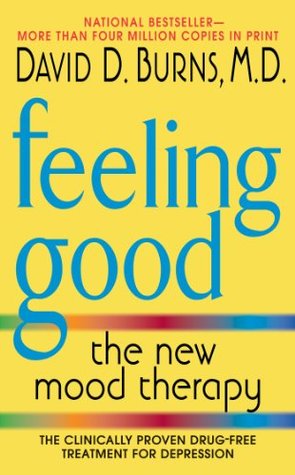More on this book
Community
Kindle Notes & Highlights
Depression is one of the worst forms of suffering, because of the immense feelings of shame, worthlessness, hopelessness, and demoralization.
Many depressed patients have told me, in fact, that they yearned for death and prayed every night that they would get cancer, so they could die in dignity without having to commit suicide.
mood elevation.
The first principle of cognitive therapy is that all your moods are created by your "cognitions," or thoughts. A cognition refers to the way you look at things—your perceptions, mental attitudes, and beliefs. It includes the way you interpret things—what you say about something or someone to yourself. You feel the way you do right now because of the thoughts you are thinking at this moment.
The second principle is that when you are feeling depressed, your thoughts are dominated by a pervasive negativity. You perceive not only yourself but the entire world in dark, gloomy terms. What is even worse—you'll come to believe things really are as bad as you imagine them to be.
Our research has documented that the negative thoughts which cause your emotional turmoil nearly always contain gross distortions.
The implications are important. Your depression is probably not based on accurate perceptions of reality but is often the product of mental slippage.
In my experience the most crucial predictor of recovery is a persistent willingness to exert some effort to help yourself. Given this attitude, you will succeed.
There's a difference between feeling better—which can occur spontaneously—and getting better—which results from systematically applying and reapplying the methods that will lift your mood whenever the need arises.
Every time you feel depressed about something, try to identify a corresponding negative thought you had just prior to and during the depression. Because these thoughts have actually created your bad mood, by learning to restructure them, you can change your mood.
The pain of rejection is generated almost entirely from overgeneralization.
Mental Filter.
When you are depressed, you wear a pair of eyeglasses with special lenses that filter out anything positive. All that you allow to enter your conscious mind is negative. Because you are not aware of this "filtering process," you conclude that everything is negative. The technical name for this process is "selective abstraction." It is a bad habit that can cause you to suffer much needless anguish.
Disqualifying the positive is one of the most destructive forms of cognitive distortion.
challenge the validity of the perceptions that create your feelings.
One usual side effect of emotional reasoning is procrastination. You avoid cleaning up your desk because you tell yourself, "I feel so lousy when I think about that messy desk, cleaning it will be impossible." Six months later you finally give yourself a little push and do it. It turns out to be quite gratifying and not so tough at all. You were fooling yourself all along because you are in the habit of letting your negative feelings guide the way you act.
your feelings are not facts! In fact, your feelings, per se, don't even count—except as a mirror of the way you are thinking.
But these abnormal emotions feel just as valid and realistic as the genuine feelings created by undistorted thoughts, so you automatically attribute truth to them. This is why depression is such a powerful form of mental black magic.
Once you invite depression through an "automatic" series of cognitive distortions, your feelings and actions will reinforce each other in a self-perpetuating vicious cycle. Because you believe whatever your depressed brain tells you, you find yourself feeling negative about almost everything. This reaction occurs in milliseconds, too quickly for you even to be aware of it. The negative emotion feels realistic and in turn lends an aura of credibility to the distorted thought which created it. The cycle goes on and on, and you are eventually trapped. The mental prison is an illusion, a hoax you
...more
Your thoughts create your emotions; therefore, your emotions cannot prove that your thoughts are accurate.
He said a depressed self-image can be characterized by the four D's: You feel Defeated, Defective, Deserted, and Deprived.
Freud believed the therapist should agree that the patient is, in fact, uninteresting, unlovable, petty, self-centered, and dishonest. These qualities describe a human being's true self, according to Freud, and the disease process simply makes the truth more obvious:
Are depressed patients actually facing the ultimate truth about themselves? And what, in the final analysis, is the source of genuine self-esteem? This, in my opinion, is the most important question you will ever confront.
At the bottom line, only your own sense of self-worth determines how you feel.
Both the schizophrenic and depressed patients made many logical errors and had difficulty in extracting the meaning of the proverbs. They were overly concrete and couldn't make accurate generalizations.
In practical terms the study indicated that during periods of depression you lose some of your capacity for clear thinking; you have trouble putting things into proper perspective. Negative events grow in importance until they dominate your entire reality—and you can't really tell that what is happening is distorted. It all seems very real to you. The illusion of hell you create is very convincing.
As a cognitive therapist, I have three aims in dealing with your sense of worthlessness: a rapid and decisive transformation in the way you think, feel, and behave.
It is not known with certainty why such a simple technique works so well, but systematic self-monitoring frequently helps develop increased self-control.


